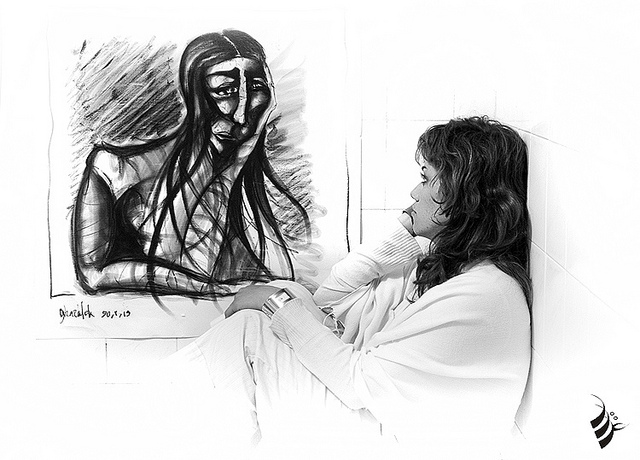
Warning: Adult language and content below.
We are all familiar with the word “abuse.”
Typically we tend to think of this as the kind we can see, that leaves physical wounds and can cause psychological damage.
But there is another type of abuse, one that is far less talked about and happens to far more of us than we realize. It may be happening quietly in the depths of a romantic relationship, with a coworker or even family member.
It’s called emotional abuse.
words that broke the person who I was and made me feel like I was nothing.
Emotional abuse involves a consistent pattern of belittling comments, threatening remarks, put-downs, humiliations and constant criticism. Name calling, especially during arguments can be especially damaging.
Worthless. Pitiful.
A stupid whore.
A f*cking c***. A piece of sh*t.
A stupid b*tch.
Afterwards, the person may say they did not mean it, but when the cycle continues over and over again, it can cause severe emotional trauma.
And this is where I found the inner strength to love myself again.
Through yoga, meditation and daily mantras, I found the inner strength to love myself again. Without this key step, I do not believe I would have ever had the awareness to see what was happening in my relationship from the outside, giving me the courage to ultimately end it.
What to do if you are in abusive relationship:
1. Tell someone.
You have to tell someone. A close friend, family member, therapist—no one knows what happens behind closed doors. The sooner you begin to open up about what is happening and talking about what has been going on, the sooner the reality of the situation will become clear to you.
It wasn’t until I confided in close friends that I realized what was happening to me was wrong. I began writing down the words and phrases from the verbal attacks and reading them to my therapist—to force myself to admit it was really happening.
2. Love yourself more.
The problem with emotionally abusive relationships is that most people still actually love their abuser. Because the relationship is not always bad—there have been good times many people don’t see this mistreatment as abuse—they develop coping mechanisms to withstand their situation rather than rock the boat. But abuse is about control. Abuse is a cycle: attack, reconciliation, dependence, and attack again. It will not stop. It will not stop until you break it.
And the way to break it is to learn to love yourself more than you love your abuser.
Once you begin to truly love yourself, you will no longer be able to tolerate your abusers attacks or become a dependent part of the abuse cycle and you will be able to leave. Whether this is done with journaling, yoga, taking on a challenge to build self confidence or daily affirmations (mantras are fantastic here), you need to rebuild the self confidence to know you are worth more. On really bad days, I would listen to Deva Premal’s recording of the mantra “I am love,” chanting 108 times over in my head—I am love—to build myself back up so I could teach class. I still do this when I need a pick me up.
3. End the relationship.
The relationship as you have known it, needs to end. That may mean the person you are with is able to realize the destruction they are causing and seek and receive professional help for their behavior—there is a chance of rebuilding the relationship. But in more cases than not, irreconcilable damage has been done to the head and heart, and trust cannot be rebuilt.
Emotional abuse can be more damaging in many cases than physical abuse. In this situation and in the case where your partner becomes physically abusive or will not stop verbal abuse, you need to leave the relationship. Physically leave.
Number three is the scariest. Why? You may have kids, own a home with your partner. Your lives are intertwined in so many complex ways that it will not be easy to untangle. But our health and well-being needs to take priority over all of these things.
None of these things are worth withstanding further abuse from someone who is supposed to love you. Additionally, the stress of emotional abuse will eventually catch up with you in the form of depression, illness or anxiety. Your family will support you. Houses can be sold. True friendships will remain and new, incredibly supportive friends will enter into your life to help you through the next chapter.
If this article hit close to home and you feel stuck, tell someone. Practice self love. Break the cycle.
You are worth it.
Author: Kat Pummill
Editor: Renée Picard
Image: GhazalehGhazanfari/Flickr
 Share on bsky
Share on bsky

Read 1 comment and reply